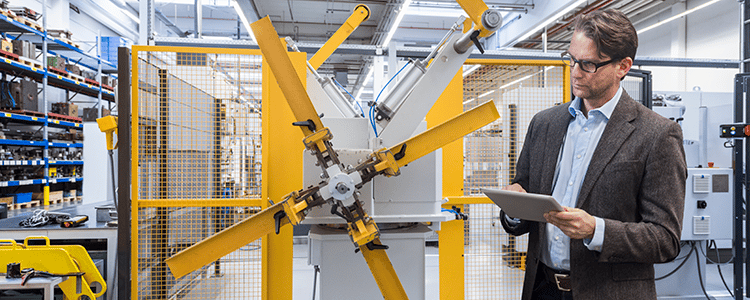Technology has been an important part of the manufacturing industry for many years. As new innovations arose, organizations were given two choices: embrace advancement or continue doing things their own way.
Those who failed to take advantage of the opportunities provided by new devices and tools were soon outpaced by their more forward-thinking competitors.
Now, an entirely new wave of technological innovation has come into manufacturing. You’ve probably heard of the term “Industry 4.0.” Well, today, we’re talking about Industry 4.0 and ERP – we’re looking at what Industry 4.0 means for your business and why an enterprise resource planning (ERP) solution is a critical component of this trend.
What is Industry 4.0?
Industry 4.0 is a term that has recently become a buzzword and generally refers to the future of manufacturing. Simply put, there are several technologies that are poised to revolutionize the entire manufacturing industry (even more than they’ve done so already). These include but are not limited to:
- Cloud Computing
- Artificial Intelligence
- Big Data
- The Internet of Things (IoT)
Taken together, these innovations and the various ways in which they will change the way we work are referred to as Industry 4.0.
On a practical level, this will mean that devices and tools will be able to communicate with each other like never before. This digital transformation will create new opportunities for organizations, enabling them to achieve increased levels of automation while leveraging a plethora of data to improve their processes.
The only catch? As manufacturers implement more disparate tools and platforms, they will need a platform that can tie everything together. One platform that enables you to accomplish this is an ERP system.
2025 Top 10 Manufacturing ERP Systems Report
Are you a mid- to large-sized manufacturing firm? This report is for you. Download it now to learn what kind of advanced functionality is available in the market today.
Why You Need an ERP System
While Industry 4.0 can streamline processes throughout a manufacturing organization, the full advantages of these developments can only be realized through an integrated platform, like a manufacturing ERP system. This is where Industry 4.0 and ERP converge.
An enterprise resource planning system is the glue that holds an organization together. Without an ERP system, it is nearly impossible to track and analyze the hundreds of new data inputs that Industry 4.0 technology creates.
While ERP systems are already integral for organizations’ day-to-day operations, Industry 4.0 makes ERP systems even more important. For example, new technology in your facilities means new vulnerabilities from a network security perspective. An ERP system, such as one of the top ERP systems, can help you to provide protection for the data that is being tracked and communicated by your devices.
In addition, many ERP systems provide mobile apps, allowing managers to instantly see operational data and insights without having to be on-site.
One of the other major benefits of combining industry 4.0 and ERP is that it grants you greater visibility into your processes. An abundance of new devices could result in data silos, but ERP systems can identify and remove these silos by providing a single place to collect and analyze data.
New Ways to Improve Processes and Performance
Industry 4.0 is bringing IoT devices into the manufacturing space, which is bringing unprecedented levels of connectivity.
These tools and devices track and record large amounts of data. For example, on the modern plant floor, sensors can be used to track raw materials and all product manufacturing processes. All this data can be used to improve processes and cut costs.
The key to achieving this improvement is an ERP system. An ERP system accepts all this data as inputs and then outputs the information in easy-to-read dashboards and reports that you can use as the foundation for your process improvement efforts.
Artificial intelligence (AI) is also a critical component here. With so many data inputs, it can be difficult to spot every single trend and incident, even with optimized reporting and analysis. An intelligent ERP system equipped with machine learning and AI can alert you to problem areas before you are even aware of them. This helps to cut down on the noise so you can focus on what matters most to your operations.
Integrated Decentralization
These new technologies will also lead to more decentralization of management throughout your organization. Each team member and employee will have the tools at their disposal to see the big picture and take more control over their departments.
That said, some kind of integration is still essential to enable engineering to work efficiently with the plant floor. This integration is only possible through an agile ERP system. An adaptable ERP system permits this decentralization while providing the integration necessary for comprehensive visibility.
Many manufacturing companies are globally distributed and rely on cloud computing for interconnectivity. An ERP platform can allow you to view data and analytics on your entire supply chain, connecting all your plants and locations as your assets move from raw materials to shelf-ready products.
How to Find the Right ERP System for Your Business
Industry 4.0 and ERP are an excellent match. If you have seen the many benefits of an ERP system, especially in light of Industry 4.0, you might be curious about how to find the best ERP solution for your organization. Our ERP consulting company can help you select and implement the right technology for your business. Contact us below for a free consultation.













